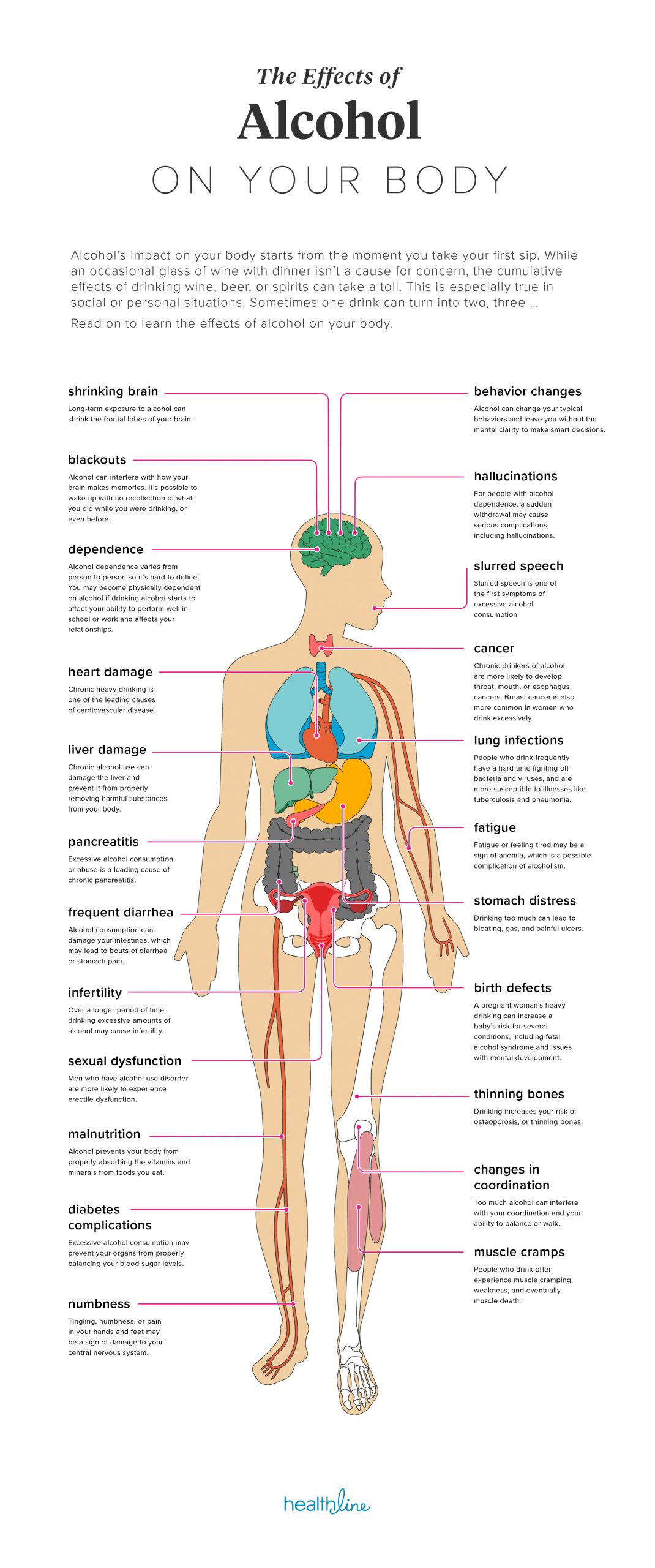Contributed by Ines Beltran
Alcohol is a legal, sedative drug that does not contain any nutrients for the body. We consume alcohol as part of many social occasions. In excess, alcohol can disrupt body function causing nutrient deficiencies and problems metabolizing nutrients.
Here are four negative impacts of alcohol:
- Alcoholic beverages primarily consist of water, alcohol (ethanol) and different amounts of sugar. Calories that come from alcohol and sugar and are called “empty calories;” this is because of the lack of essential nutrients. Essential nutrients like carbohydrates, protein, fat, vitamins, minerals and water provide the tools that the body needs to perform properly. Alcohol is something that you may choose to add to your diet, but it’s not something that you need in it. Alcohol would not fall under the category of an essential nutrient.
- Alcohol improves the drinker’s mood. The more you drink, the more parts of your brain become numbed from the sedative drug, alcohol. As the alcohol moves quickly to the brain, it affects the frontal lobe increasing enjoyment, euphoria and happiness. Alcohol can also make you more relaxed; however, it can take away your judgment. Drinkers expect positive outcomes from drinking, which increases how much they consume.
- People who become alcoholics often eat poorly and don’t consume essential nutrients. This interferes with the nutritional process and affects digestion, storage, utilization and excretion of nutrients. Some alcoholics ingest as much as 50 percent of their total daily calories from alcohol. This may affect their blood glucose levels and cause deficiency of vitamins A, E, and D that can be associated with night blindness and softening of the bones. Deficiencies of other vitamins can also cause severe neurological damage.
- In pregnant women, alcohol itself is toxic to the fetus. If the mother is not eating nutritional meals, poor fetal development can also occur. During pregnancy the nutritional needs are 10 to 30 percent greater than normal. Food intake can increase by as much as 140 percent to cover the needs of both mother and fetus. Nutritional deficiencies of an alcoholic mother affect the nutrition of the fetus negatively, but alcohol itself can also restrict nutrition flow to the fetus.
The below infographic from Healthline shows many other serious effects of alcohol on the body. Alcohol consumption can become a habit, and it’s hard to know when you are drinking too much. Habits are unconscious, and that means you aren’t aware you are doing it. To change your drinking habit, you first have to recognize it. Once you understand it’s happening, you can begin to change it.
Alcohol consumption can become a habit, and it’s hard to know when you are drinking too much. Habits are unconscious, and that means you aren’t aware you are doing it. To change your drinking habit, you first have to recognize it. Once you understand it’s happening, you can begin to change it.
Follow these steps to make a real change:
- Measure how much you drink and when;
- Identify your trouble-spots and
- Plan how to deal with them.
This blog post has been updated since it was originally published.
 Ines Beltran is the Family and Consumer Sciences Agent at the UGA Extension Gwinnett. The UGA Extension Gwinnett operates as part of the University of Georgia’s College of Agricultural and Environmental Sciences and College of Family and Consumer Sciences. The UGA Extension Gwinnett Office also functions as an educational division of the Gwinnett County Department of Community Services. For more information, please visit their website, call 678-377-4010 or email at extensionservice@gwinnettcounty.com.
Ines Beltran is the Family and Consumer Sciences Agent at the UGA Extension Gwinnett. The UGA Extension Gwinnett operates as part of the University of Georgia’s College of Agricultural and Environmental Sciences and College of Family and Consumer Sciences. The UGA Extension Gwinnett Office also functions as an educational division of the Gwinnett County Department of Community Services. For more information, please visit their website, call 678-377-4010 or email at extensionservice@gwinnettcounty.com.
You can find the Spanish version of this blog here.
